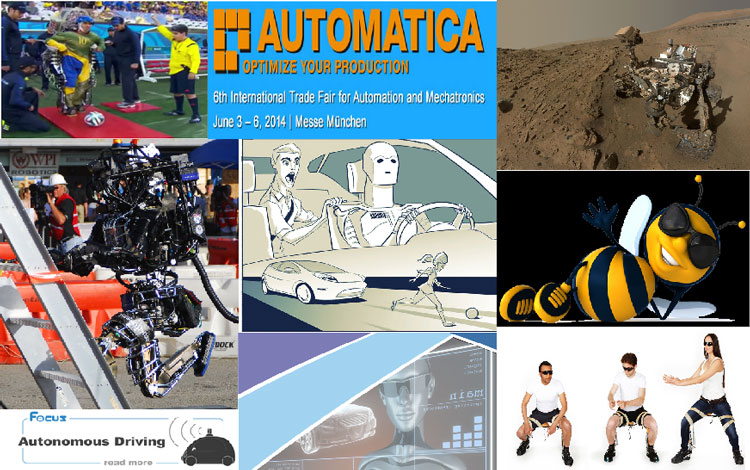
Robohub.org
Robohub Digest June 2014: Robots at the World Cup, machine ethics and more
A quick, hassle-free way to stay on top of robotics news from recent weeks, our monthly digest is released on the first Monday of every month.

FAA dallies while drone community rallies
The Federal Aviation Administration (FAA) featured heavily in robotics news this June, starting with their first ever approval for a commercial unmanned flight over land. While touted by the FAA as an important first step in the area of drone regulation, experts agree that more needs to be done to allow commercial drone business in the US to grow. The FAA is now considering special waivers for drone use in the film making industry, but it has prohibited the use of UAVs in other areas, including using drones for package deliveries. This was not good news for Amazon as the company was hoping to “get packages into customers’ hands in 30 minutes or less” with their Prime Air drone delivery service.
While the FAA’s Pirker ruling from last March is still under appeal, those wishing to use drones for deliveries are continuing to make plans, hopeful that there will be a future for this industry. This is despite a ban on drones in National Parks and a recent ruling by the Federal Communications Commission issuing a $34.9 million fine to a company that sells GPS-jammers might spell yet more problems for drone regulation in the years ahead.
Indeed, it was not all bad news for UAVs this month. The drone community in South Africa is thriving, and in other parts of the world, follow-me drones are riding a wave of popularity – with startup AirDog vastly exceeding its initial crowdfunding goal.
Robots at the World Cup
UAVs were also featured in football news, with allegations that the French team’s closed practice had been spied on by a quadrotor. Recalling an earlier story about the Packbot serving security detail at Brazil’s twelve World Cup stadiums, you might think that the news is all about surveillance. But these stories were overshadowed by a far more positive story about the World Cup, with robotics playing a vital role in enabling a very special start to the event. Kick-off happened so fast that you might have missed it, but the first shot was actually taken by a paralysed man who was supported by an exoskeleton. Why? The skeleton’s developers wanted to show that Brazil is about more than just football, with a thriving science community and inventions to be proud of.
More exoskeletons
The World Cup exoskeleton story was not the only one in the news this June. The Federal Drug Administration just approved an exoskeleton for home use by people with lower body paralysis. It is hoped that this device will “have an immediate, life-changing impact on individuals with spinal cord injuries”. Similarly, a new start-up company, Noonee, is hoping that its Chairless Chair will benefit those who must spend long periods of time bending and crouching at work. The Noonee chair is essentially an exoskeleton for the legs that can be fixed by the push of a button to support workers when they are required to spend long periods of time in one position. Prototype testing is currently under way.
That’s what friends are for
While exoskeletons can support people on the outside, other robots are offering a different kind of support – as social companions. As MIT’s Cynthia Breazeal has argued, social and ‘humanised’ robots have the potential to change people’s lives. These types of robots were a big theme this June, owing to the unveiling of Pepper the robot by Japanese company SoftBank. Pepper is designed to be sensitive to its environment, to read and react to human emotions, and to communicate with people. The robot will be available to Japanese consumers as of next February.
Are you for real?
As robots like Pepper become more intelligent and more human-like, the challenge of creating a robot that can trick humans into thinking it is a real-life person no longer seems unachievable; note that Russian chatbot Eugene was hailed as passing the Turing Test this June. However, critics have voiced their doubts about the robot’s achievement, claiming that if the rules of the test were stringently applied, the robot would not have passed.
Nevertheless, it’s hard to argue against the fact that robots are becoming more intelligent and independent, and to wonder what the future of AI will bring. In a wide-ranging interview with CNBC, Elon Musk explained that earlier this year he invested in AI company Vicarious in order to “keep an eye on what’s going on in artificial intelligence”. When asked what AI could be used for, Musk replied “I don’t know, but there are some scary outcomes and we should try to make sure that the outcomes are good.”
An ethical dilemma
Given all the news about social robotics and AI in recent weeks, it would seem there is an urgent need for regulation and a code of ethics to govern human-robot interaction. Here at Robohub we thought it a nice co-incidence that this theme was featured in the Robots Podcast this month.
Ethical issues are of course not only a consideration relevant to designers of social robots, but also to developers of autonomous vehicles. One aspect of this was outlined by Jason Millar on Robohub, who explored the “Tunnel Problem” and its implications for the design of autonomous cars in our autonomous vehicle series. Robohub readers contributed their thoughts on the dilemma through one of our reader polls, with almost two thirds electing the passenger’s safety over that of a person in the road.
Star power: Good for business
While Robohub editors agreed that it was rather US-centric, Business Insider published a list of the most important people working in robotics today, and robotics business news in general was encouraging this June. Note an increase in venture capital funding, reports on a surge in the number of robotics patents being awarded in the last decade, and growth forecasts for the mobile robotics market as well as the home cleaning and entertainment sector. Further announcements at this year’s AUTOMATICA in Munich confirmed record industrial robot sales, and introduced a new EU robotics funding programme, and various other funding streams.
With nearly 35,000 visitors this year, AUTOMATICA featured the likes of Universal Robots, KUKA, gomTec and SMErobotics, all introducing exciting new products. The even also brought robot users and manufacturers together to explore future needs and solutions as part of a panel discussion that may well inspire the next generation of robots.
DRC update
Gill Pratt’s DARPA issued new information about the DRC finals, due to take place in a year’s time. Stating that DARPA was impressed with the results at the DRC trials, Pratt said they have made the challenges more difficult than initially planned. The big news, however, was that SHAFT announced that they would withdraw from the competition despite having won the trials. New teams sponsored by Japan, Korea and the EU will be joining the fray, and the competition will be still open to new teams until February 2015. We are looking forward to the finals next June!
Robot selfies on Mars
We couldn’t wrap up this month’s digest without tipping our hats to Curiosity, which celebrated its 1 year anniversary on Mars this month by taking a selfie – by coincidence we had just published an article about robot selfies a few weeks earlier.
Upcoming events in July to watch out for:
- International Symposium on Automation and Robotics in Construction and Mining (ISARC 2014) – July 9-11
- CiROS – China (Shanghai) International Robot Show – July 9-11
- Robotics Science and Systems Conference – July 12-16
- Hamlyn Symposium on Medical Robotics 2014 – July 12-15
- International Conference on Intelligent Autonomous Systems (IAS-13) – July 15-19
- Robot Film Festival IV – July 19
- RoboCup Competition – July 21-24
tags: Robohub Digest




